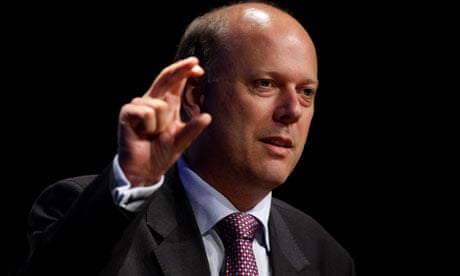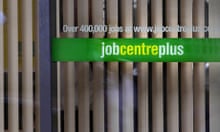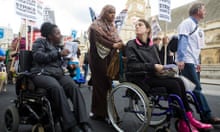The government's flagship Welfare to Work policy is inciting hatred and violence towards the disabled by portraying them as cheats and benefits scroungers, an alliance of charities has warned.
A drip-feed of statistics about claimants who have been denied benefits by the Department for Work and Pensions because they are deemed fit to work threatens the safety and quality of life of its members, says an alliance of 50 charities. The government is feeding a negative attitude towards people with disabilities, which, the charities warn, will ultimately end in violence.
The alliance has written an open letter to Iain Duncan Smith, the work and pensions secretary, after complaining that private warnings on the issue have gone unheeded. The charities say the government should instead be promoting the talents of those who no longer need to claim benefits. Alice Maynard, the chair of Scope, who is a wheelchair user, said: "We just feel it is too much now. It is becoming such a frequent occurrence, it is likely to have some very serious negative effects. I think in the end it ends up in violence."
She added that a hardening of attitudes meant she now "thought harder" about going out at night in London.
Since the coalition government came to power, it has released quarterly statistics on the number of people who are turned down when claiming employment support allowance, which replaces incapacity benefit and income support paid on incapacity grounds.
"Statistics released today show that three-quarters of people who apply for employment and support allowance are continuing to be found either fit for work or stop their claim before completing their medical assessment," said the Department for Work and Pensions.
The charities said the release of the figures and briefings from the DWP was feeding the stereotype that people who claimed benefits were scroungers. Four out of 10 of those turned down for support are granted it on appeal, said the charities, but this had not been widely publicised. Instead, a series of newspaper stories had been published featuring so-called benefits scroungers and cheats.
A recent survey carried out by Scope found more than a third (37%) of people said attitudes towards them had got worse over the past year.
Jaspal Dhani, chief executive of the United Kingdom Disabled People's Council, said: "The language portrays disabled people as scroungers, as lazy – a drain who are not playing their part and making a contribution. It has led to an increase in hate crimes against disabled people, victimisation and reinforcement of very old stereotypes and prejudices.
"In my experience as a disabled person in the last few months, when I have engaged strangers in conversation, they are surprised that as a wheelchair user I actually work."
The letter published in the Observer today from the Disability Benefits Consortium, a group that includes charities Scope, Mencap and Mind, says: "Every time your department reveals statistics on assessments for employment and support allowance, it highlights the people whose applications failed – implying high levels of fraud and unnecessary claims.
"Such releases fail to tell the whole story. The fact is that eligibility criteria for this benefit are set incredibly high, while flaws in the assessment mean many people with a significant level of impairment are declared fit for work. These statistics also overlook the fact that nearly four out of 10 appeals against the original decision are successful, and this rises significantly where the person has representation.
"This partial picture feeds the tabloid media's negative narrative on 'benefits scroungers', and these releases in turn have an impact on the public – and therefore employers' – perception of disability and disabled people. Yet, under the Convention on the Rights of Persons with Disabilities, the government has a duty to protect the dignity of disabled people."
Last night Liberal Democrat MP Stephen Lloyd said he had repeatedly raised the problem with the employment minister, Chris Grayling. "For many months now on the select committee and in the chamber I have been on the one hand supporting the government's general direction on the work programme, while at the same time demanding that ministers and the DWP use appropriate language for people who are on benefits. The phrases 'benefit cheats' and 'scroungers' – while we are trying to support people with disabilities back into work – are inappropriate.
"I have received assurances from Chris Grayling that this point has been recognised. The government is being much more positive in this whole area. I will continue to hold them to account."
A DWP spokesman referred to Grayling's comments at a recent select committee, during which he claimed that he could not prevent the publication of negative press about benefit claimants.
"I have had personal discussions with a number of media outlets about the need to be careful about how the issue is presented," said the spokesman. "I will carry on doing so, because it is very important that we get the balance right. I do not control the editorial approach of the tabloids, and sometimes stories run in ways that completely bemuse me and are certainly beyond any expectations."




Comments (…)
Sign in or create your Guardian account to join the discussion